|
|
|
Sort Order |
|
|
|
Items / Page
|
|
|
|
|
|
|
| Srl | Item |
| 1 |
ID:
139789
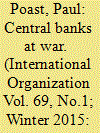

|
|
|
|
|
| Summary/Abstract |
War is expensive—troops must be equipped and weapons must be procured. When the enormous borrowing requirements of war make the sovereigns' credibility problem more difficult, central banks enhance a government's ability to borrow. By being the sole direct purchaser of government debt, the central bank increases the effective punishment that can be imposed on the government for defaulting on the marginal lender. This increases lenders' confidence that the government will be punished in case of default, making lenders willing to purchase the debt at a lower rate of interest. The sovereign, dependent on the low borrowing costs offered by the central bank, has an incentive to retain the bank. Data covering the nineteenth and early twentieth centuries reveal that possessing a central bank lowers the sovereign's borrowing costs, particularly during times of war.
|
|
|
|
|
|
|
|
|
|
|
|
|
|
|
|
| 2 |
ID:
139787
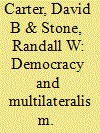

|
|
|
|
|
| Summary/Abstract |
Democracies are more supportive of US positions on important votes in the UN General Assembly than of nondemocracies. Is this because democracies share common perspectives, or does this pattern reflect coercion? Since 1985, US law has stipulated that the US State Department identify important votes and that aid disbursements reflect voting decisions. To unravel these alternative explanations, we introduce a strategic statistical model that allows us to estimate voting preferences, vulnerability to influence, and credibility of linkage, which are theoretical quantities of interest that are not directly observable. The results reject the hypothesis of shared democratic values: poor democracies have voting preferences that are more oppositional to US positions than autocracies, and they are more willing than autocracies to take symbolic stands that may cost them foreign aid. Democracies support US positions, however, because US aid linkages are more credible when directed toward democratic countries. Splitting the sample into Cold War and post–Cold War segments, we find that the end of the Cold War changed the way US linkage strategies treated allies and left- and right-leaning governments, but the effects of democracy remained constant.
|
|
|
|
|
|
|
|
|
|
|
|
|
|
|
|
| 3 |
ID:
139794


|
|
|
|
|
| Summary/Abstract |
This research note hypothesizes that international agreements including a finite duration provision or with a shorter expected duration should take less time to negotiate. Using a random sample of agreements across different issue areas, it finds statistical support for this hypothesis. Agreements without a finite duration provision experienced a bargaining phase that was twice as long as agreements including a finite duration provision and otherwise short-term agreements. This result not only offers empirical support for the theoretical proposition that a longer shadow of the future leads to increased bargaining delay—it also has important policy implications. International negotiators can include a finite duration provision when they prefer a shorter bargaining phase to a potentially more durable agreement, and they can avoid this feature when they prefer a more durable agreement, although this decision comes with the cost of additional bargaining delay. By treating finite duration provisions as an independent variable, this result also addresses a critique of the research program on the rational design of international institutions that it moves backward by considering only design features as dependent variables.
|
|
|
|
|
|
|
|
|
|
|
|
|
|
|
|
| 4 |
ID:
139793
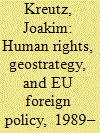

|
|
|
|
|
| Summary/Abstract |
Is foreign policy influenced by humanitarian concerns, or are concepts such as human security merely rhetoric for traditional power politics? Using a multilevel modeling technique and a unique data set of military and economic European Union (EU) intervention 1989–2008, I find that military and economic interventions by the EU are conducted in response to humanitarian atrocities but that geostrategic concerns also influence EU action. While the EU consistently is more likely to act against countries with greater civilian victimization, the size of the effect is influenced by spatial considerations. The EU is most attentive to human rights violations in non-EU European states, followed by countries in sub-Saharan Africa, while it has been least active in Asia and the Americas.
|
|
|
|
|
|
|
|
|
|
|
|
|
|
|
|
| 5 |
ID:
139790


|
|
|
|
|
| Summary/Abstract |
Existing studies of foreign aid suggest that donor countries' economic groups, such as exporters, should be generally opposed to multilateral aid because multilateral flows do not allow donor countries to tie their aid implicitly or explicitly to the promotion of their domestic economic interests. However, economic groups can actually benefit from some types of multilateral aid, and this serves as an incentive for donor governments to support international organizations generating the benefits. I test my argument using data on aid allocated to the Multilateral Fund for the Implementation of the Montreal Protocol and the Global Environment Facility, and international trade by commodity. I find robust empirical support for the argument that when donors' domestic economic groups are likely to gain from opportunities created by international environmental organizations' programs, donor governments increase aid allocations to these organizations.
|
|
|
|
|
|
|
|
|
|
|
|
|
|
|
|
| 6 |
ID:
139788
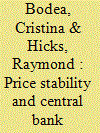

|
|
|
|
|
| Summary/Abstract |
Despite mixed empirical evidence, in the past two decades central bank independence (CBI) has been on the rise under the assumption that it ensures price stability. Using an encompassing theoretical approach and new yearly data for de jure CBI (seventy-eight countries, 1973–2008), we reexamine this relationship, distinguishing the role of printing less money (discipline) from the public's beliefs about the central bank's likely actions (credibility). Democracies differ from dictatorships in the likelihood of political interference and changes to the law because of the presence of political opposition and the freedom to expose government actions. CBI in democracies should be directly reflected in lower money supply growth. Besides being more disciplinarian, it also ensures a more robust money demand by reducing inflation expectations and, therefore, inflation. Empirical results are robust and support a discipline effect conditioned by political institutions, as well as a credibility effect.
|
|
|
|
|
|
|
|
|
|
|
|
|
|
|
|
| 7 |
ID:
139792
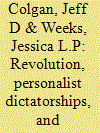

|
|
|
|
|
| Summary/Abstract |
A consensus exists that countries that have recently undergone domestic political revolutions are particularly likely to become involved in military conflicts with other states. However, scholars seek to understand when and why revolutions increase the likelihood of international violence. In contrast to existing work focusing on international systemic factors, we argue that revolution fosters conflict in part by affecting states’ domestic political structures. Previous research has shown that revolution tends to bring particularly aggressive leaders to power. We demonstrate that revolutions also frequently result in personalist dictatorships, or regimes that lack powerful institutions to constrain and punish leaders. By empowering and ensconcing leaders with revisionist preferences and high risk tolerance, revolutions that result in personalist dictatorships are significantly more likely to lead to international conflict than revolutions that culminate in other forms of government. Our arguments and evidence help explain not only why revolution so commonly leads to conflict, but also why some revolutions lead to conflict whereas others do not.
|
|
|
|
|
|
|
|
|
|
|
|
|
|
|
|
| 8 |
ID:
139791
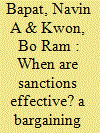

|
|
|
|
|
| Summary/Abstract |
Although a considerable literature identifies the conditions under which sanctions are more likely to be successful, few studies examine the question of when sanctioning states or senders are willing to enforce their sanctions laws against their firms. Using a game theoretic model, we argue that imposing sanctions creates a strategic dilemma for senders. We demonstrate that senders often have disincentives to enforce their sanctions policies, given that the restriction on economic transactions with targeted states may undermine their firms' competitiveness. The model indicates that sanctions are more likely to succeed when the sender's firm retains a moderate share of the target's market relative to its foreign competitors. However, the model also demonstrates that sanctions are likely to be imposed only when the conditions do not favor their success. The empirical implications of the model are tested using the Threat and Imposition of Economic Sanctions (TIES) data set.
|
|
|
|
|
|
|
|
|
|
|
|
|
|
|
|
|
|
|
|
|